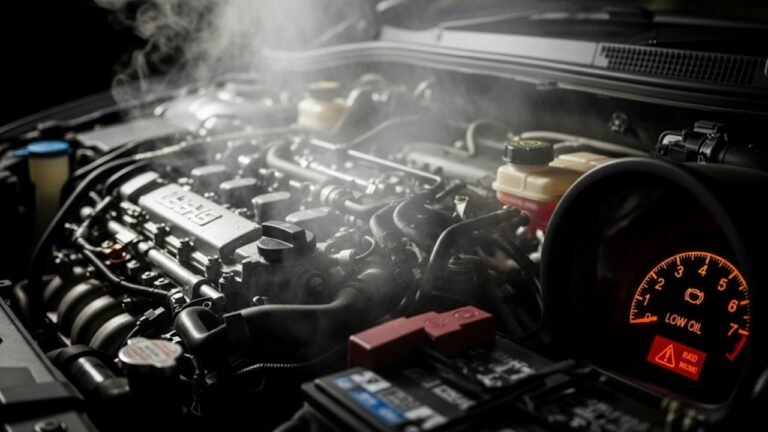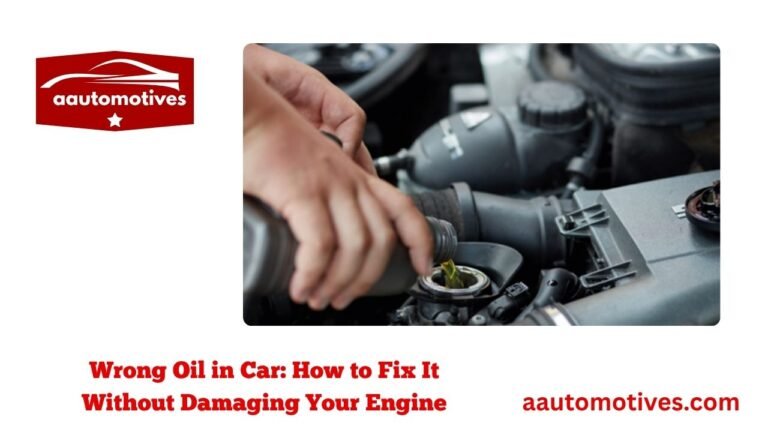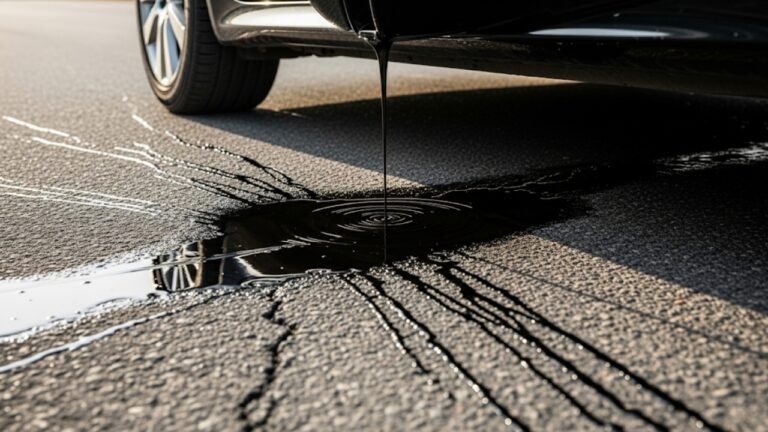Why Does My Car Lose Oil Pressure?

Have you ever been driving down the highway, feeling that satisfying hum of your car, and then — boom — the oil pressure light comes on? It’s enough to send chills down your spine. I remember the first time it happened to me. My old Honda Civic flashed that ominous red light, and my heart nearly jumped into my throat. Why does my car lose oil pressure, I wondered, feeling helpless and worried about expensive repairs.
You’re not alone in asking this. Losing oil pressure is scary, and for good reason — it can cause major engine damage if ignored. But don’t panic just yet. Think of your oil system as your car’s bloodstream. If something goes wrong, you need to fix it fast, but it doesn’t mean you’re doomed.
In this article, I’ll help you figure out why does my car lose oil pressure, using simple words and relatable stories. We’ll look at common causes, warning signs, how to fix it, and even what you can do to avoid a meltdown on the side of the road.
Let’s break it down together, in a way that feels like chatting over a cup of tea — honest, down-to-earth, and real.
In This Article
- 1 When Oil Pressure Drops: Why It Matters
- 2 Common Reasons Why Oil Pressure Drops
- 3 Signs That Your Oil Pressure Is Dropping
- 4 Why Oil Leaks Cause Pressure Loss
- 5 How the Wrong Oil Damages Your Engine
- 6 How to Fix Low Oil Pressure Without Breaking the Bank
- 7 Can Driving With Low Oil Pressure Ruin My Car?
- 8 Oil Pressure Warning Light Keeps Coming On?
- 9 How Mechanics Diagnose Low Oil Pressure
- 10 Maintenance Tips to Keep Oil Pressure Strong
- 11 How Weather Affects Oil Pressure
- 12 Table: Quick Oil Pressure Troubleshooting
- 13 Real Talk: My Personal Oil Pressure Disaster
- 14 FAQs
- 15 Final Thoughts: Listen to Your Car
When Oil Pressure Drops: Why It Matters

Think of it like your own blood pressure. If it’s too low, vital organs (or in this case, engine parts) won’t get what they need. If oil pressure falls, metal can scrape metal, leading to wear, overheating, or even total engine seizure. That’s not something you want to risk.
Here’s what proper oil pressure helps with:
-
Lubricates moving parts
-
Carries away heat
-
Cleans out debris
-
Keeps engine parts healthy
If oil pressure is too low, your car is like an athlete running a marathon with no water — it won’t last long.
And believe me, I’ve been there. I once ignored a flickering oil light, and after just a couple of weeks, the repair bill was so big I could have bought a decent used car instead.
Common Reasons Why Oil Pressure Drops
So, why does my car lose oil pressure anyway? The truth is, a lot of things can go wrong. Let’s walk through the most common ones so you can spot the problem fast.
1️⃣ Low oil level — This is the classic cause. Maybe you forgot to top up, or there’s a leak. If there’s not enough oil in the pan, the pump can’t build proper pressure.
2️⃣ Worn engine bearings — As engines age, their internal clearances widen. This allows oil to leak past instead of holding pressure, kind of like a leaky blood vessel.
3️⃣ Faulty oil pump — If the pump fails or gets clogged, it won’t circulate oil correctly. No oil flow = no pressure.
4️⃣ Clogged oil filter — Your filter keeps junk out of the oil, but if it clogs, the flow gets blocked. Some engines have a bypass valve, but if that fails too, you’re in trouble.
5️⃣ Oil viscosity problems — Using the wrong oil can mess up flow. If it’s too thin, it won’t hold pressure.
Here’s a quick table to show you how these compare:
| Problem | Effect | Fix |
|---|---|---|
| Low oil level | Starves pump, loses pressure | Add correct oil, check for leaks |
| Worn bearings | Excess clearance bleeds pressure | Rebuild or replace bearings |
| Bad oil pump | No circulation, pressure drops | Replace the oil pump |
| Clogged oil filter | Blocks oil flow, risks engine starvation | Replace oil filter |
| Wrong oil viscosity | Oil too thin or thick affects pressure | Use proper grade oil |
Honestly, most times I hear people ask, why does my car lose oil pressure, it’s usually one of these. I always suggest starting simple: check your oil level and look for leaks.
Signs That Your Oil Pressure Is Dropping
Maybe you’re wondering, “How do I even know my oil pressure is going bad?” Great question. Cars usually tell us — if we listen.
I’ll never forget the day my friend’s Corolla started knocking like a woodpecker on steroids. He ignored the oil light for a week. Guess what? Rod bearing failure. $3,000 later, he learned his lesson.
Here’s what to watch out for:
-
Oil pressure warning light — This is the big one. Don’t ignore it!
-
Engine ticking or knocking — That metallic tap can mean no oil is reaching vital parts.
-
Overheating — Oil helps cool your engine, so if pressure drops, the temperature climbs.
-
Burnt oil smell — Low pressure can cause overheating, which burns oil.
-
Drop in engine performance — Loss of power or rough idle can mean things are wearing out.
If you see these, pull over if it’s safe, and shut off the engine. Better to be safe than sorry.
Why Oil Leaks Cause Pressure Loss
Let’s talk about oil leaks. They’re one of the most common answers to why does my car lose oil pressure. When oil drips away, there’s less left for the pump to pressurize. It’s like trying to water your garden with a cracked hose — pressure drops no matter how hard you try.
Oil can leak from:
-
Valve cover gaskets
-
Oil pan gasket
-
Rear main seal
-
Oil filter housing
Once I had a leaking rear main seal on my old pickup. I ignored it because, hey, a drip here and there seemed harmless. One day, the oil light came on, and I barely made it to a shop before it locked up. Lesson learned: those drips add up.
If you spot oil stains on your driveway, don’t brush it off. Even a tiny leak can snowball into a big problem.
How the Wrong Oil Damages Your Engine
Here’s something a lot of people overlook. Maybe you’re a do-it-yourself type, changing oil on a Saturday, like me. It feels good to get your hands dirty. But if you choose the wrong oil grade, you could answer your own question — why does my car lose oil pressure.
Engines are designed for specific viscosities. Too thin, and it can’t build up pressure. Too thick, and it won’t flow right. Modern engines are tight and precise. They want the Goldilocks of oils — not too thin, not too thick, just right.
When I switched to a cheap 20W-50 once, thinking “thicker is better,” my car ran horribly. Cold starts were rough, and oil pressure was all over the place. Switching back to the factory 5W-30 fixed it. Lesson: trust the specs.
How to Fix Low Oil Pressure Without Breaking the Bank
Let’s be honest — most of us don’t have stacks of cash lying around for surprise car repairs. So if you’re asking why does my car lose oil pressure, you’re probably hoping there’s a way to fix it without emptying your wallet. Good news — sometimes you can!
First, check the simple stuff:
✅ Top up your oil. It sounds basic, but I can’t count the number of people I’ve seen panic about the oil light only to discover they were just a quart low.
✅ Change your oil filter. A clogged filter can cause big headaches. Swap it out if you haven’t in a while.
✅ Use the right oil. Look in your manual. Your engine is picky — give it what it needs.
✅ Inspect for leaks. A cheap dye kit and a UV light can help you find sneaky leaks fast.
✅ Change the oil pressure sensor. Sometimes the sensor fails, not the engine. That tiny part costs less than dinner out with friends.
Of course, if you hear serious knocking, or the oil pressure stays low even after these checks, get it to a mechanic. Engine bearing or oil pump repairs aren’t DIY territory unless you really know your stuff.
Can Driving With Low Oil Pressure Ruin My Car?
I get it — you’re busy. You might think, “Maybe I can make it home, then worry about the oil pressure tomorrow.” But trust me, low oil pressure is one of those things you shouldn’t mess around with.
When there’s no pressure, engine parts grind together. It’s like running a marathon barefoot on broken glass. So yes — driving with no oil pressure can absolutely destroy your engine, often beyond repair.
If you see the oil pressure light, don’t gamble. Pull over safely, check the oil level, and call for help if you’re unsure. It’s a lot cheaper than rebuilding your motor.
Oil Pressure Warning Light Keeps Coming On?
Here’s something I wish someone had told me earlier. If your oil pressure warning light flickers, then goes off, then comes back, don’t ignore it. That’s your car’s way of crying for help.
A light that turns on and off usually means borderline pressure. Maybe the oil pump is wearing out, or your engine is on the brink of bigger trouble. It’s like your body telling you something hurts — you wouldn’t ignore chest pain, right?
A good mechanic can test oil pressure with a manual gauge to know what’s really happening. If your light is doing a disco routine, get it checked.
How Mechanics Diagnose Low Oil Pressure
When you take your car in, the mechanic does more than just peek under the hood. Here’s what usually happens:
-
They’ll check oil level and look for leaks
-
They might hook up a manual gauge to verify true pressure
-
Inspect the oil filter and oil pump
-
Look at bearing clearances with specialized tools
-
Scan the car’s computer for any stored codes
Sometimes it’s easy to fix. Other times, they might need to pull the engine apart to get to worn bearings or a faulty pump.
Maintenance Tips to Keep Oil Pressure Strong
Look, engines are expensive. Taking a few simple steps will help you avoid asking why does my car lose oil pressure in the first place.
✅ Change your oil on schedule — don’t wait
✅ Always use the oil grade the factory recommends
✅ Replace the filter every oil change
✅ Inspect for leaks now and then
✅ Watch for warning lights and noises
✅ Keep an eye on your temperature gauge
These tiny habits are like brushing your teeth. They don’t seem huge, but they save you thousands over time.
How Weather Affects Oil Pressure
Here’s something a lot of folks miss. Extreme temperatures can affect oil flow. On a freezing winter morning, oil thickens, making it hard to pump. On a blazing summer day, oil can thin out too much, dropping pressure.
Modern multigrade oils help, but still, it’s smart to warm up gently in winter and avoid overheating in summer. Think of your engine like an athlete — it needs a proper warm-up and reasonable working conditions.
Table: Quick Oil Pressure Troubleshooting
| Symptom | Possible Cause | What to Do |
|---|---|---|
| Oil light stays on | Low oil, pump failure, worn parts | Check oil, see a mechanic fast |
| Oil light flickers | Borderline pressure, dirty filter | Change filter, check oil grade |
| Knocking noise | Bearing damage, oil starvation | Stop driving, tow to a shop |
| Smell of burning oil | Leak dripping on hot parts | Inspect seals and gaskets |
| Engine runs rough | Lack of lubrication, overheating | Check oil level, get a diagnosis |
Real Talk: My Personal Oil Pressure Disaster
Let me tell you a story to really bring this home. Years back, I had a secondhand BMW. It was beautiful, but one day the oil pressure light flickered on during a long drive. I ignored it — thought I’d fix it “later.”
A week later, my engine made the scariest knocking sound I’ve ever heard. I pulled over, checked the oil — bone dry. A rear main seal had let go. That one mistake cost me a full engine rebuild.
I’m telling you from the heart — don’t be like me. Take oil pressure seriously.
FAQs
1. What is normal oil pressure for most cars?
Most cars idle around 20–30 psi and run 40–60 psi while driving, but always check your owner’s manual.
2. Can I still drive if the oil pressure light goes on and off?
No. Have it checked right away. Flickering means borderline pressure, which can destroy your engine.
3. Why does my oil light come on only at idle?
That usually means worn bearings or a tired oil pump. Pressure is lowest at idle, so problems show up there first.
4. Is synthetic oil better for oil pressure?
Synthetic oil can handle heat and flow better than conventional oil, but you still must use the correct viscosity.
5. How often should I check my oil level?
At least once a month, and before long trips.
6. Can a bad oil pressure sensor trigger the light?
Yes! If your oil level is good but the light stays on, the sensor might be the problem.
7. Will thicker oil fix low pressure?
Not really. It can hide symptoms for a while, but it won’t solve worn parts or leaks.
8. Is low oil pressure dangerous?
Absolutely. It can destroy your engine in minutes if ignored.
Final Thoughts: Listen to Your Car
If there’s one thing to remember from all this, it’s that why does my car lose oil pressure is a question you should never leave unanswered. Oil is the heart of your engine, and oil pressure is its heartbeat. If you see that warning light, hear a knock, or smell burnt oil, act fast.
Car repairs can be stressful, but with a bit of knowledge and a calm approach, you can handle it. Think of it like taking care of a friend — your car deserves a little love, too.
If you ever feel overwhelmed, don’t be embarrassed to call a trusted mechanic. There’s no shame in asking for help when it comes to protecting one of your biggest investments.






